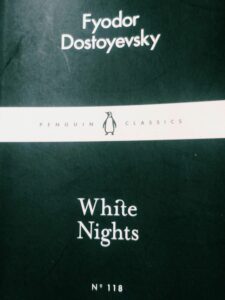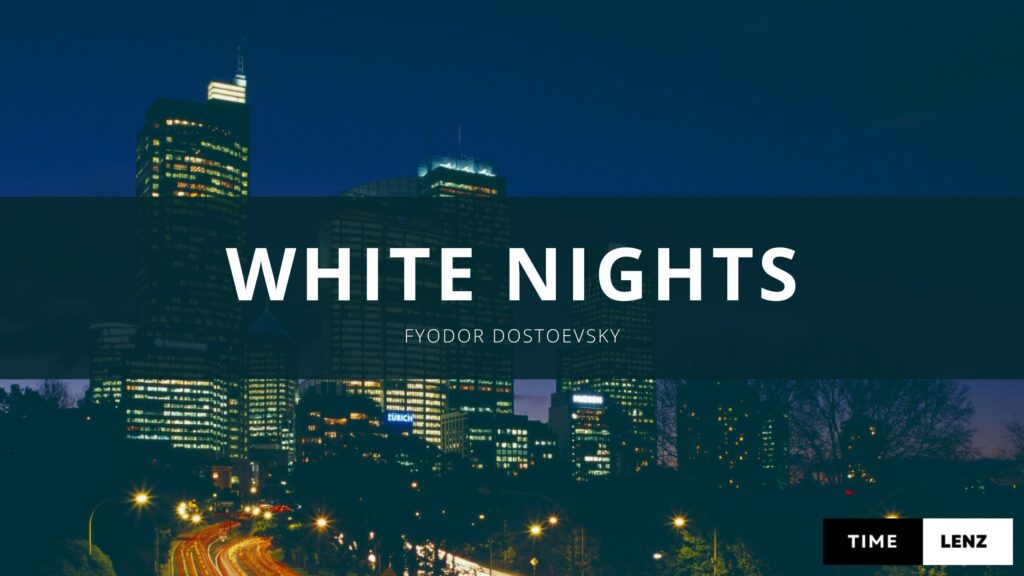White Nights is a short story by the famous Russian writer Fyodor Dostoevsky that covers the story of a lonely man falling in love with a girl named Nastenka on their first meet. It covers their interaction over four nights and forming a bond and a relationship that ends in pain for both.
As usual, the main protagonist of the story is nameless. However, one can relate him to the experiences of the author. Upon wandering the streets of St. Petersburg, our hero is a lonely man searching for love and friendship. His anticipation will finally come true when he saves a girl from a man and open up with her like water falling from a dam.

A Cold Daunting Experience
Our hero is on the streets enjoying his loneliness and watching people go home to their loved ones. Meanwhile, when he reaches his favourite location (bridge), he sees a girl lost in her thoughts. He tried to say something but was hesitant. However, the girl was ambushed by a man. The hero saved her, and then she came close to him.
From there, the story begins, and both characters become fond of each other and share their life stories.
Opening Up To One Another
Both Nastenka and our hero grew closer and shared their life stories. First, the hero shared his lonely life, losing his identity to find love and friendship. He blamed his shyness for not being able to make friends or acquaintances. But when he was with Nastenka, he couldn’t stop a second and carried his tale. At this time, he is in love with the girl as she is the one he was waiting for.
The same thing happened the night after; however, this time, it was Nastenka’s turn; she told him about her orphan life with her grandmother. But there came a catch, and she told him about her lover. Moreover, she told him about her love for him because he became his friend rather than falling in love at first sight.
It crushed the spirit of our hero, and upon that, she even asked him to write a letter in hopes of communicating with her lover. Thus, our hero falls into the unusual paradox where he loves her, and she loves him for not loving her, a similar theme resembling the condition of so many young men in modern society.
A Confession For Sanity In White Nights
Our hero wrote the letter, which was excruciating for him, but he was in love with Nastenka and couldn’t care a bit about his situation. After delivering the letter to Nastenka’s lover, he came to see her.
Nastenka was disappointed as her lover didn’t come, and it seemed a suitable opportunity for our euro to confess his love, which he did and in return, Nastenka was ready to be with him. But in the end, her lover came, and she kissed our hero goodbye, wishing she could be with them.
Cold And White Nights
The whole scenario broke our hero, and he was gone, but in the morning, a letter came, a sort of apology from Nastenka. He read the letters many times with tears in his eyes which had immense love for Nastenka, but he didn’t care about his condition and just wished her well. Lastly, our hero accepted his fate to return to his lonely life of observing and celebrating the moments with Nastenka.
Quote: “My God! A Whole Minute Of Bliss! Is That So Little For The Whole Of Man’s Life?’
-White Nights
Know More About White Nights On Goodreads
Final Words
White Nights is a short story by Russian writer Fyodor Dostoevsky about a lonely man falling in love with a girl named Nastenka. The story takes place over four nights, with the hero saving a girl from a man and opening up to her. They share their life stories, and the hero falls in love with Nastenka, but she tells him about her lover. Finally, the hero confesses his love to Nastenka, but Nastenka is disappointed and leaves, leaving the hero to face the pain of his love.
Frequently Ask Questions
What is the title of the story referring to?
The story’s title refers to white nights in Saint Petersburg during the summer solstice.
What are some of the literary devices in the story?
Some literary devices in the story include foreshadowing, symbolism, and irony.
What are some of the themes of the story?
Some of the story’s themes include love, dreams, hope, loneliness, and the power of imagination.

